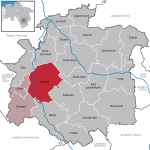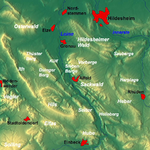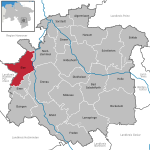Gronau (Samtgemeinde)
Former Samtgemeinden in Lower SaxonyHanover region geography stubs
Gronau is a former Samtgemeinde ("collective municipality") in the district of Hildesheim, in Lower Saxony, Germany. Its seat was in the town Gronau. On 1 November 2016 it was merged into the new Samtgemeinde Leinebergland. The Samtgemeinde Gronau consisted of the following municipalities: Banteln Betheln Brüggen Despetal Eime Gronau Rheden
Excerpt from the Wikipedia article Gronau (Samtgemeinde) (License: CC BY-SA 3.0, Authors).Gronau (Samtgemeinde)
L 480, Samtgemeinde Leinebergland
Geographical coordinates (GPS) Address Nearby Places Show on map
Geographical coordinates (GPS)
| Latitude | Longitude |
|---|---|
| N 52.0667 ° | E 9.7833 ° |
Address
L 480
31028 Samtgemeinde Leinebergland
Lower Saxony, Germany
Open on Google Maps


